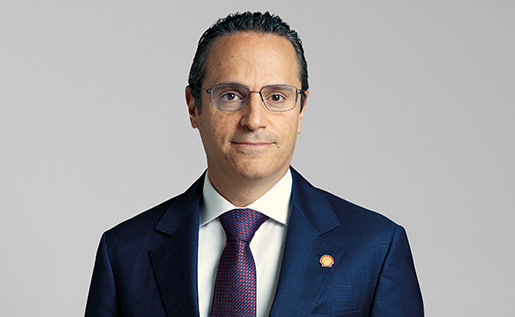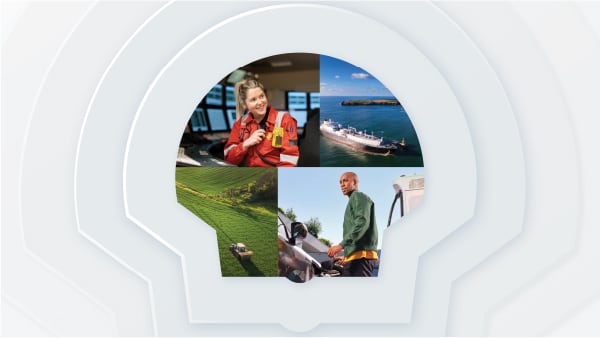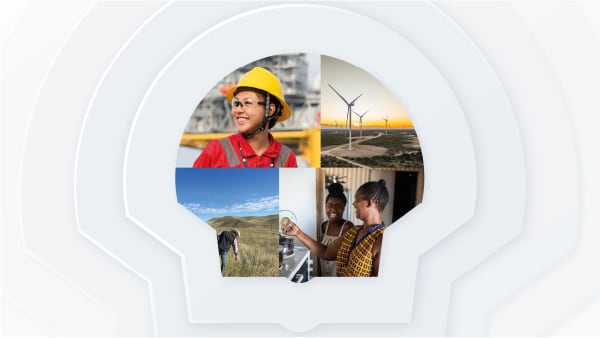Chief Executive Officer's review

“We will deliver more value for our shareholders, our customers and wider society, with less emissions.”
In 2023, the Russia-Ukraine war continued and renewed conflict in the Middle East raised the spectre of another regional war. Too many lives have been destroyed and I hope for an end to these human tragedies soon. Geopolitical volatility and the fragmentation of our world are growing at a time when we should be working together to fight the global challenge of climate change.
A balanced energy transition, which Shell supports, is one that maintains secure and affordable energy supplies, while the world builds the clean energy system of the future. Billions of people depend on energy and hundreds of millions still hope to have access to it. Energy is vital for lives everywhere.
The energy system has shown promising signs of progress, despite geopolitical, supply chain and regulatory challenges. Renewable power has seen record growth in recent years and one-fifth of all new car sales in the world are now electric. In March, I saw the results of this growth first-hand on a Shell electric vehicle charging site in Beijing serving around 1,000 customers a day.
At Shell, we sharpened our Powering Progress strategy in 2023 with a relentless focus on performance, discipline and simplification as we move towards becoming a net-zero emissions energy business by 2050. We will deliver more value for our shareholders, our customers and wider society, with less emissions. At Capital Markets Day in June, we showed how we plan to profitably transform Shell through the strength of our portfolio, our technological and trading capabilities, and our deep customer relationships. We will be guided by the financial and climate targets and ambitions we have set.
Performance and discipline
It was another strong year for Shell. One highlight for me was QGC in Australia, which had its highest ever liquefied natural gas (LNG) production in the fourth quarter and delivered its 1,000th LNG cargo. Another was the strong operational performance in our deep-water portfolio. Completing the acquisition of Nature Energy, which expanded the range of low-carbon energy we can offer, also stood out.
Cash flow from operations for 2023 of around $54 billion was the second-highest in our history, income was around $20 billion and Adjusted Earnings* around $28 billion. Our performance enabled us to return $23 billion to shareholders* through $15 billion in share buybacks and $8 billion in dividends. This is 42%* of cash flow from operations (CFFO) and around the upper end of our 30-40% of CFFO through the cycle target range.
We continue to be disciplined in our investments, focusing on where we can have the maximum impact in generating value or lowering emissions. In 2023, cash capital expenditure* of $24 billion was at the lower end of our $23-27 billion range.
Between 2023 and 2025, we plan to invest around $40 billion in oil and gas. An example of more value with less emissions is the Vito platform (Shell interest 63.1%) in the Gulf of Mexico, which started production in 2023. Vito cost less to build because its topsides and hull are a third of the size of its original design and is expected to produce around 80% less emissions over its operating life. We are using the same concept for two more platforms: Whale (Shell interest 60%) and Sparta (Shell interest 51%).
Simplification
From July 1, 2023, our smaller Executive Committee took effect with two clear business directorates, and a single finance, strategy, mergers and acquisitions and sustainability directorate. This simplification has already enabled more streamlined planning and improved decision-making. We are also in the process of moving to our new Safety, Environment & Asset Management Standards (SEAM), which will reduce the number of key requirements to around 500 from the current 1,800 and enable our people to focus on implementing our strategy more efficiently.
By the end of 2023, we had achieved around $1 billion of structural cost reductions*, positioning us well to save the $2-3 billion we said we would by the end of 2025.
Less emissions
I am proud that by the end of 2023, we had achieved more than 60% of our target to halve emissions in our own operations by 2030, compared with 2016 levels on a net basis. We will work to continue reducing emissions from our own operations, including by powering oil and gas platforms with renewable energy. In August, our unmanned solar- and wind-powered platform in the Timi gas field (Shell interest 75%) delivered first gas and we will continue to explore this concept.
In support of a balanced energy transition, between 2023 and 2025, we will invest around $35 billion in Downstream and Renewables and Energy Solutions. In 2023, we invested $5.6 billion in low-carbon energy, including the acquisition of Nature Energy and in the CrossWind joint venture off the Dutch coast, which will supply renewable power to the Holland Hydrogen 1 electrolyser. In China, we opened our largest electric vehicle charging station, while globally we continued to transform our refineries into energy and chemicals parks.
Our strategy confirms our commitment to Integrated Gas, particularly LNG where we are growing our portfolio even more and will increase capacity by around 11 million tonnes per year in the second half of the decade – that is an annual increase of more than a quarter of our current capacity. LNG plays a major role as a lower-carbon alternative to coal and as a partner to wind and solar for electricity generation. As we increase our LNG activities, we will continue work on reducing our methane emissions to near-zero by 2030.
We want to remain a leader in biofuels and as demand for low-carbon fuels grows, we expect to sell less oil products. We aim to lead in the energy transition where we have competitive strengths, see strong customer demand, and identify clear regulatory support from governments. To help drive the decarbonisation of transport, we have set a new ambition to reduce customer emissions from the use of our oil products by 15-20% by 2030, compared with 2021 (Scope 3, Category 11) [A].
As we pursue more value with less emissions, we must remain disciplined. For example, last summer we pulled out of a tender for a wind farm off the coast of Germany when it did not meet our test for capital discipline.
The importance of learning
The safety of everyone working for Shell is our top priority. I am deeply saddened by the death of five contractor colleagues in incidents that took place at Shell operations in 2023. One contractor in Malaysia and another in the Philippines died while at work. In Nigeria, two contractors were shot, along with four government security agents, in an appalling attack on a convoy. Also in Nigeria, a contractor injured in a tugboat fire late in 2023 died in early 2024. My heart goes out to all the families and friends of those who have died. Our personal safety results fell short of what we achieved in 2022 and we are committed to doing better through learning from these and other incidents. Applying what we have learned in the past has helped us achieve our lowest number of process safety events on record in 2023.
I visited Oman in June for our Safety Day. This was significant for me because it is where I started at Shell 26 years ago. Talking to our people there brought back many memories – my passion for the business, my hope for the future, but also how much I had to learn. We must always be open to new ideas.
Being the best we can be
Our strategy is also about respecting nature and powering lives. We give more detail on how we are progressing in these areas in this Annual Report (in sections Respecting nature and Powering lives) and in our Sustainability Report.
In 2023, I visited a number of our teams, including in Abu Dhabi, Brazil, China, Kazakhstan, the Netherlands, Oman, Qatar and the United States. I never cease to be impressed by the calibre of people I meet on these trips. Shell's best asset is its people. Streamlining our organisation can harness their creativity by cutting bureaucracy and making processes more efficient. I want our people to focus their energies on making Shell the best it can be.
At Shell, we are guided by the clarity of our purpose to provide more and cleaner energy solutions. We focus on what we can control. And, as we embed performance, discipline and simplification into Shell's culture, I believe we are the investment case through the energy transition.
Wael Sawan
Chief Executive Officer
* Non-GAAP measure (see Non-GAAP measures reconciliations).
[A] Customer emissions from the use of our oil products (Scope 3, Category 11) were 517 million tonnes carbon dioxide equivalent (CO2e) in 2023, 569 million tonnes CO2e in 2021 and 819 million tonnes CO2e in 2016.










